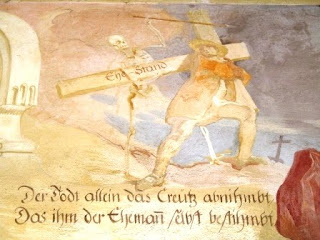The couplets were obviously painted before German spellings and noun capitalization were standardized. While Stefan and I were trying to decipher the rhymes, we ran the whole shebang through "Google Translate." The results were not very helpful, but the program did generate the line "Be merciful to us in the scooters," so it was clearly worth the effort.

Hier schlafft das kindt, dort ewig wacht,
weil ihm den Todt ein Music macht.
[Here sleeps the child, there wakes eternally,
for Death makes music for him.]
weil ihm den Todt ein Music macht.
[Here sleeps the child, there wakes eternally,
for Death makes music for him.]

Das ABC kaumb schreibt der Knab,
Ruefft ihn der Todt schon in das grab.
[Hardly has the youth written his ABCs
when Death calls him already to the grave.]
Ruefft ihn der Todt schon in das grab.
[Hardly has the youth written his ABCs
when Death calls him already to the grave.]

Beim Haar der Todt ergreift den Kopf,
Zu diser Wueth taugt ihm der Zopf.
[Death grips the head by the hair,
the braid is useful for that anger.]
Zu diser Wueth taugt ihm der Zopf.
[Death grips the head by the hair,
the braid is useful for that anger.]

Zu fechten, zu spihlen, die Jugendt ist gwohnt,
dem alter der Jugendt der Todt nit verschont.
[To fence and to play, youth is accustomed,
Death spares not the youth for his age.]
dem alter der Jugendt der Todt nit verschont.
[To fence and to play, youth is accustomed,
Death spares not the youth for his age.]

Mit aschen Zierth der Todt das Haupt,
Die besser als der puder taugt.
[Death decorates the head with ashes,
which are better than powder.]
Die besser als der puder taugt.
[Death decorates the head with ashes,
which are better than powder.]

Der Todt allein das Creutz abnihmbt,
Das ihm der Ehemann selbst bestihmbt.
+ Ehe-Stand
[Death alone removes the cross
that the bridegroom takes upon himself.]
[+ The State of Matrimony]
Das ihm der Ehemann selbst bestihmbt.
+ Ehe-Stand
[Death alone removes the cross
that the bridegroom takes upon himself.]
[+ The State of Matrimony]

Sey uns doch gnaedig
in dem Gricht,
und nit nach maaß der suenden
Richt!
[Be merciful to usin the scooters in judgment,
and don't judge by the measure of sin!]
in dem Gricht,
und nit nach maaß der suenden
Richt!
[Be merciful to us
and don't judge by the measure of sin!]

Der eigne kopf macht lauter Zanck,
Dem Todt darumb vor disen danck.
[Your own head stirs lots of trouble,
for which Death is thankful.]
Dem Todt darumb vor disen danck.
[Your own head stirs lots of trouble,
for which Death is thankful.]

Zu fahren zu reuthen der Todt ist bereuth,
Damit er den Adel erhalte zur beuth.
[Death is prepared to travel by foot or horse,
so he can gain nobility as his loot.]
Damit er den Adel erhalte zur beuth.
[Death is prepared to travel by foot or horse,
so he can gain nobility as his loot.]

Dem betler in der Hungers not
Der Todt ihm ist das liebste brod.
[For the starving beggar,
Death is the best of bread.]
Der Todt ihm ist das liebste brod.
[For the starving beggar,
Death is the best of bread.]

Die schwarze Mehs lis ich vor dich,
Die Huelf darvon hof ich vor mich.
[The black Mass I read before you,
and for that I hope to receive help.]
Die Huelf darvon hof ich vor mich.
[The black Mass I read before you,
and for that I hope to receive help.]

Beim pflueg der Baur das Brod gewint,
Beim pflueg den Baur der Todt auch nimt.
[By the plough, the farmer wins his bread,
By the plough, Death also takes the farmer.]
Beim pflueg den Baur der Todt auch nimt.
[By the plough, the farmer wins his bread,
By the plough, Death also takes the farmer.]



2 comments:
That's a very creepy sequence you've got posted there, barely leavened by the enertaining robo-translation.
Scooters indeed. Death on a Vespa?
Death on a Vespa during Vespers?
I can't tell if the couplets are supposed to be witty or morbid, or maybe both. "Your time is coming too" is hardly a comforting message to see at a funeral chapel. But I suspect the general public a few centuries ago had a lot more hands-on experience with the dead than we have today.
Post a Comment